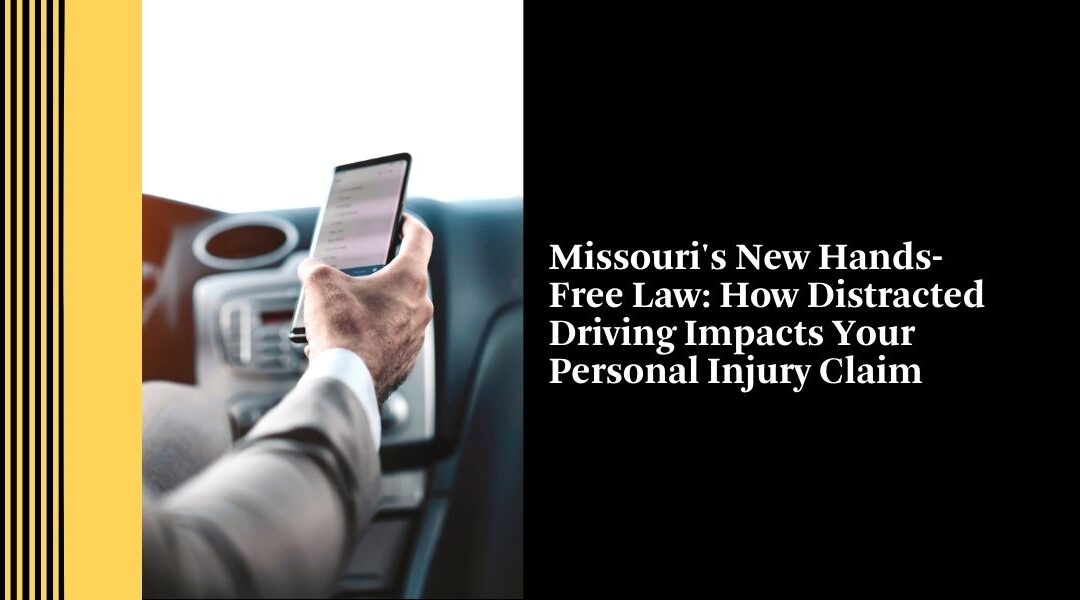In the blink of an eye, a simple glance down at a phone can change a life forever. With the rise of smartphones, distracted driving has become a pervasive danger on our roads, leading to a tragic number of avoidable accidents. Here in Missouri, lawmakers have recognized this threat and taken a decisive step to curb it with the passage of the “Siddens Bening Hands-Free Law,” a new piece of legislation that significantly impacts how we drive—and how we pursue justice after a crash.
The law, which went into effect in August 2023 with enforcement starting on January 1, 2025, is more than just a new rule of the road; it’s a powerful tool in holding negligent drivers accountable. As a firm that has seen firsthand the devastation caused by distracted driving, we want to explain what this law means for you and your ability to seek compensation after an accident.
Understanding the New Law
The core of the Siddens Bening Hands-Free Law is simple: with very few exceptions, you are prohibited from physically holding or supporting a cell phone or other electronic communication device while driving. This includes typing, sending text messages, browsing social media, watching videos, or even just holding the device in your hand, lap, or any other part of your body.
The law applies to all drivers on public roads and highways in Missouri, regardless of age. While it does allow for the use of hands-free technology like Bluetooth, speakerphone, or a mounted GPS device, any action that requires you to physically interact with the phone is now illegal. This clear prohibition is a major shift from previous, more lenient regulations that only restricted younger drivers from texting.
How the Law Impacts Your Personal Injury Claim
In a personal injury case, the central issue is proving that the at-fault driver’s negligence caused your injuries. Before this new law, proving that a driver was distracted could be challenging. It often relied on witness testimony or a deep investigation to subpoena phone records. But with the hands-free law, we have a clear legal standard to establish negligence.
If a driver violates this law and causes an accident, their actions can be used as strong evidence of negligence. Violating a safety statute, like the hands-free law, can be a crucial component of your claim. It demonstrates that the at-fault driver failed to exercise “reasonable care” while operating their vehicle. This direct link between their illegal behavior and the resulting crash can significantly strengthen your case, helping us fight for the full compensation you deserve for medical bills, lost wages, and pain and suffering.
What to Do After an Accident Caused by a Distracted Driver
If you are involved in a car accident and suspect the other driver was on their phone, it’s vital to act quickly to preserve evidence. If it is safe to do so, immediately take photos of the accident scene, including any visible damage to the vehicles and, if possible, any indication that the other driver was using their phone. It’s also critical to get the other driver’s information and, if there were witnesses, their contact details.
Even if you feel okay after a crash, you should seek medical attention right away. Not only is this important for your health, but it also creates a formal record of your injuries, which is essential for any future claim.
Finally, contact a personal injury lawyer experienced in handling distracted driving cases. At Sticklen & Sticklen, we can help you navigate the legal complexities of proving negligence under this new law. We have the resources to conduct a thorough investigation, subpoena phone records, and build a strong case to hold the at-fault driver accountable for their actions.
A distracted driving accident can turn your life upside down, but you don’t have to face the aftermath alone. If you’ve been injured by a driver who was on their phone, our team is here to help. Contact our offices in Joplin or Columbia, Missouri, today for a free, no-obligation consultation to discuss your case. We are committed to helping you get the justice and compensation you are entitled to under Missouri law.

